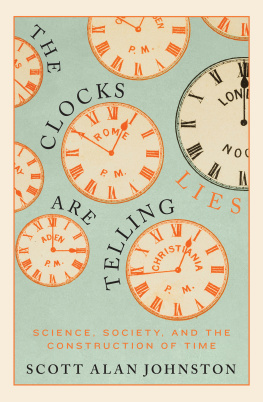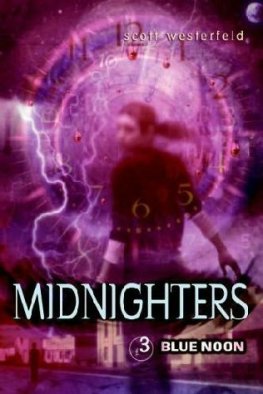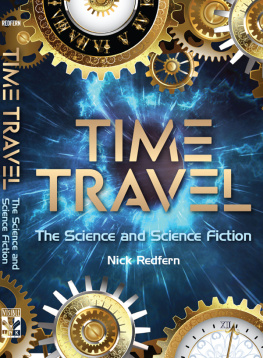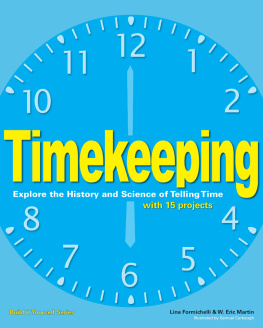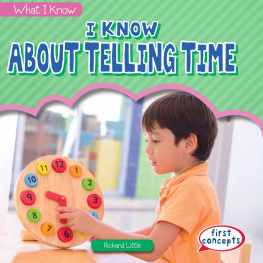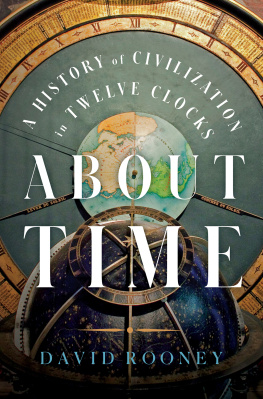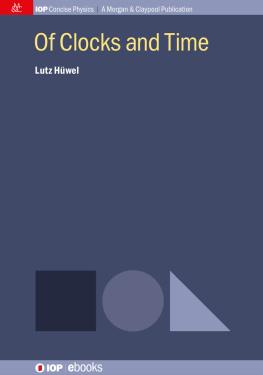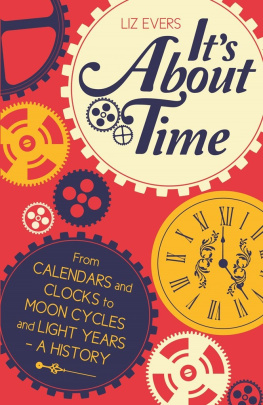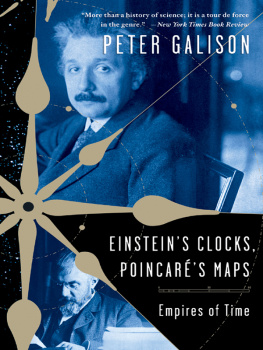Contents
Page List
Guide

THE CLOCKS ARE TELLING LIES
THE CLOCKS ARE TELLING LIES
Science, Society, and the Construction of Time
SCOTT ALAN JOHNSTON
McGill-Queens University Press
Montreal & Kingston London Chicago
McGill-Queens University Press 2022
ISBN 978-0-2280-0843-9 (cloth)
ISBN 978-0-2280-0963-4 (ePDF)
ISBN 978-0-2280-0964-1 (ePUB)
Legal deposit first quarter 2022
Bibliothque nationale du Qubec
Printed in Canada on acid-free paper that is 100% ancient forest free
(100% post-consumer recycled), processed chlorine free
We acknowledge the support of the Canada Council for the Arts.
Nous remercions le Conseil des arts du Canada de son soutien.
Library and Archives Canada Cataloguing in Publication
Title: The clocks are telling lies : science, society, and the construction of time / Scott Alan Johnston.
Names: Johnston, Scott Alan, author.
Description: Includes bibliographical references and index.
Identifiers: Canadiana (print) 20210305460 | Canadiana (ebook) 2021030569X | ISBN 9780228008439 (hardcover) | ISBN 9780228009634 (PDF) | ISBN 9780228009641 (ePUB)
Subjects: LCSH: TimeSystems and standardsHistory. | LCSH: TimeSocial aspects History. | LCSH: HorologyHistory. | LCSH: Time measurementsHistory. | LCSH: Clocks and watchesHistory.
Classification: LCC QB223 .J64 2022 | DDC 389/.17dc23
This book was typeset in 10.5/13 Sabon.
Contents
Tables and Figures
TABLES
FIGURES
)
)
Acknowledgments
Writing this book has been a seven-year journey for me, and its story and message feel as relevant now as when I began. I am struck, for example, by how the difficulty of accessing accurate timekeeping in the 1880s turned many reasonable, ordinary people away from modern timekeeping. Without access to it, inequality and resentment were the result. The same appears to be true today, not necessarily with respect to timekeeping, but regarding science itself. It is all too easy for science and academe to appear aloof, for expertise to seem smug, and for pseudo-science to look welcoming in contrast. The pyramidologists of Charles Piazzi Smyths era have become the climate deniers of our time (and the flat earthers are still at it, all these years later). If we are to overcome these threats to civilization and make no mistake, the consequences of ignoring climate science represent a very real threat to our future then the proliferation of misinformation must be combatted, and systemic barriers to education, including income inequality, must be removed. As this books conclusion suggests, we cannot ignore the value of equitable access to reliable information. These issues must become the rallying cry of todays academics and engaged citizens alike. They already are in some circles. But it is a difficult challenge, and one that must be pursued continuously. I applaud those individuals taking up the challenge, and I have hope that their efforts might someday make a better, kinder world.
Speaking of kindness, I am indebted to many people for their help in writing this book. First and foremost, I owe a debt of gratitude to Stephen Heathorn, whose mentorship and support were invaluable throughout the project. John Weaver and Michael Egan also provided expert advice on early versions of the manuscript, as did David Leeson. Thank you also to Dan Gorman, for encouraging me in my studies, and H.V. Nelles for teaching me the value of narrative as an analytical tool. Collectively, these six historians, directly or indirectly, helped me realize this was a story about people, not about technology, and the book is better for that realization.
I was fortunate to have the financial support of several institutions and funding bodies, including the Ontario Graduate Scholarship (OGS), McMaster University, and the Wilson Institute for Canadian History, without which I would not have been able to carry out the research necessary for this project.
I am indebted to the staff of several archives, including Mark Hurn at the Cambridge Astronomy Library, Karen Moran at the Royal Observatory of Edinburgh, Kathryn McKee at the St Johns College Library (Cambridge), Sian Prosser at the Royal Astronomical Society Archives, John Cable at the Institute of Engineering and Technology Archives, Julie Carrington at the Royal Geographical Society Archives, Chris Atkins at the Maidenhead Library, and Krista McCracken at the Shingwauk Residential Schools Centre. I am likewise thankful to the staff at the Archives of Ontario, the Archives of the Royal Society, Archivo General de la Nacion (Dominican Republic), the Bibliothque de lInstitut de France, the British Library, the BT Archives, Cambridge University Library, Library and Archives Canada, the Library of Congress, the London Metropolitan Archives, the National Archives of the United Kingdom, and the National Archives of the United States of America,
At McGill-Queens University Press, Richard Ratzlaff, Kathleen Fraser, and the rest of the team made the publishing experience as smooth as I could have hoped for. Similarly, the recommendations of the anonymous peer reviewers undoubtedly made this book better.
This book originated as a PhD dissertation for the Department of History at McMaster University. In addition, some of the ideas in I previously examined in Making Time: Transnational Networks and the Establishment of Standard Time in Canada and Beyond, 18671905, in Undiplomatic History: The New Study of Canada and the World, edited by Asa McKercher and Phillip Van Huizen (Montreal and Kingston: McGill-Queens University Press, 2019): 5675.
A delightfully large group of colleagues-turned-friends deserve thanks as well, for their advice on the manuscript, but, more important, for their friendship and support Chelsea Barranger, Samantha Clarke, Oleksa Drachewych, Curran Egan, Kelsey Hine, Mica Jorgenson, Jacqueline Kirkham, Andrew Kloiber, Shay Sweeney, and Alex Zavarise I love you all.
Lastly, I would like to thank my family. Thank you to my partner, Megan Johnston, whose love and support kept me sane through the entire project, with diversions and pep talks (not to mention her help translating documents from French). Thank you to my siblings Melissa Sillett and Steven Johnston may we be companions on many adventures to come. And lastly, thank you to my parents, Gary and Rita Johnston, who encouraged and supported me at every turn. Their love is an inspiration. I dedicate this book to them.
Abbreviations
AMS | American Metrological Society |
ASCE | American Society of Civil Engineers |
AU | astronomical unit (distance between sun and earth) |
BAAS | British Association for the Advancement of Science |
CO | Colonial Office (Britain) |
FO | Foreign Office (Britain) |
IGA | International Geodetic Association General Meeting (Rome, 1883) |
IGC | International Geographical Congress (Venice, 1881) |
IMC | International Meridian Conference (Washington, DC, 1884) |
IPAWM | International Institute for Preserving and Perfecting the Anglo-Saxon Weights and Measures |

